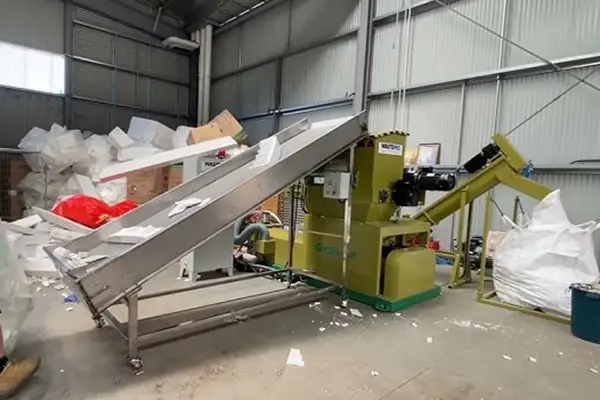Expanded Polystyrene (EPS) foam is a lightweight and versatile material commonly used in construction, packaging, and insulation. Its unique properties, such as being lightweight yet sturdy, have raised questions about its strength and durability. EPS foam’s strength is often assessed in terms of its ability to withstand compression, absorb impact, and maintain its structural integrity over time. In industries like construction and recycling, tools like an EPS Crusher are employed to handle and recycle this material effectively. This article explores whether EPS foam is strong and how its properties contribute to its widespread use.
Understanding EPS Foam
EPS foam is a closed-cell material made from polystyrene beads that expand when exposed to steam and heat. These beads fuse to create lightweight, rigid foam with a high air content. The foam is available in various densities, directly impacting its strength and applications.
Types of Strength in EPS Foam
The strength of EPS foam can be evaluated in several contexts:
- Compressive Strength
EPS foam has impressive compressive strength relative to its weight. This means it can resist deformation under pressure.- Low-Density EPS Foam: Suitable for packaging and protective applications where cushioning is required.
- High-Density EPS Foam: Commonly used in construction, such as insulation boards or structural panels, as it can support more weight without collapsing.
- Impact Resistance
Despite its rigid appearance, EPS foam is excellent at absorbing impact energy. This makes it an ideal material for packaging fragile items and for shock absorption. - Durability
EPS foam is resistant to moisture and decay, ensuring it remains intact even in harsh environments. However, it is not immune to UV degradation, so prolonged exposure to sunlight can weaken it.
Applications That Showcase EPS Foam’s Strength
- Construction
EPS foam is widely used in construction because it can withstand significant compressive loads without adding much weight.- Insulation Panels: EPS foam provides thermal insulation while maintaining structural stability.
- Geofoam: In civil engineering, EPS geofoam fills voids and reduces soil loads without compromising the strength of structures.
- Packaging
EPS foam’s impact resistance makes it a go-to material for protecting goods during transit. Its strength ensures items remain safe even under significant stress or accidental drops. - Industrial Applications
EPS foam is also used in molded shapes for industrial use, including flotation devices, lightweight concrete, and architectural elements.
Role of Density in EPS Foam Strength
The density of EPS foam directly affects its strength. Higher-density EPS foam offers greater compressive strength and is more durable under mechanical stress. However, this comes with an increase in weight and cost, so selecting the right density depends on the specific application.
For example:
- Low-Density EPS Foam: Used for lightweight packaging and craft projects.
- Medium-Density EPS Foam: Ideal for insulation and cushioning applications.
- High-Density EPS Foam: Suitable for construction and structural uses where greater strength is required.
EPS Recycling and the Role of EPS Crushers
Recycling EPS foam is an essential part of sustainable practices. Despite its strength and durability, EPS foam is lightweight and bulky, which makes disposal challenging. An EPS Crusher plays a crucial role in recycling by breaking down used foam into smaller, more manageable pieces.
- How EPS Crushers Work:
EPS Crushers compress and shred foam into granules that can be reused to produce new EPS products, reducing waste and promoting a circular economy. - Benefits of EPS Recycling:
- Reduces landfill waste.
- Minimizes the environmental footprint of EPS production.
- Extends the usability of EPS material across multiple lifecycles.
Advantages of EPS Foam Strength
EPS foam’s strength provides several advantages that make it a preferred material in various industries:
- Lightweight and Easy to Handle: Its strength-to-weight ratio makes it an efficient material for construction and packaging.
- Moisture Resistance: EPS foam maintains its strength even when exposed to water, making it ideal for outdoor applications.
- Thermal Insulation: Its structure allows for excellent thermal performance without compromising durability.
Limitations of EPS Foam Strength
While EPS foam has numerous advantages, it is not without limitations:
- Low Tensile Strength: EPS foam can break under excessive pulling or bending forces.
- Flammability: Although treated with fire retardants, EPS foam can burn under high heat.
- UV Sensitivity: Prolonged exposure to sunlight can degrade its strength and structural integrity.

Conclusion
EPS foam is strong in the context of its intended applications. Its compressive strength, impact resistance, and durability make it a reliable material in construction, packaging, and industrial settings. The density of EPS foam plays a significant role in determining its strength, with higher densities offering greater load-bearing capabilities. Tools like an EPS Crusher ensure the material’s sustainability by recycling it effectively. While it does have limitations, the versatility and strength of EPS foam continue to make it a valuable material in various industries.
Post time: 12-24-2024





